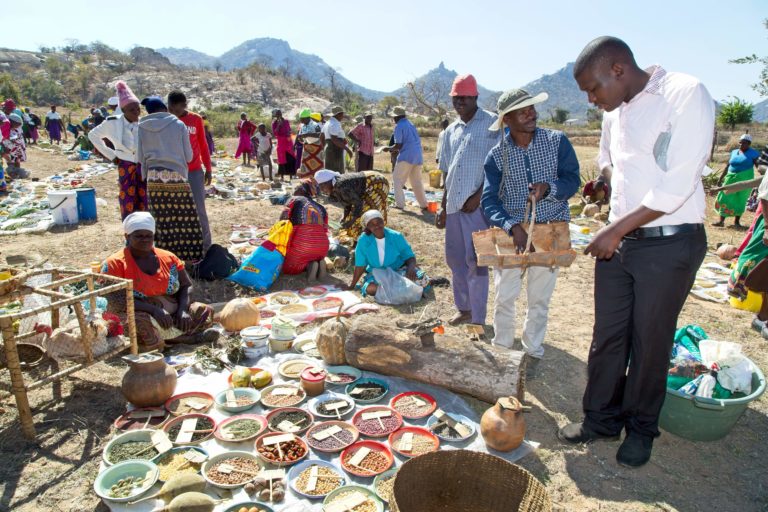By Tatenda Chitagu
MASVINGO-Loveness Ducha (61), a smallholder subsistence farmer from Shashe, Mashava in Zimbabwe’s southern Masvingo province, can now successfully control her diet from the indigenous crops she grows at her four hectare plot.
The battle for food and seed sovereignty, however, was not a stroll in the park for the diabetes patient, who dedicates the greater part of her farming plot to small grains- rapoko, cow-peas, groundnuts, round nuts, millet and sorghum, among others.
Food sovereignty is defined as the choice of people to access healthy and culturally appropriate food produced through ecologically sound and regenerative methods, while seed sovereignty entails a farmers right to save, use, exchange and sell their own seeds which are not genetically modified, patented, owned or controlled by seed companies.
“Were it not for my condition, coupled with the perennially failing maize crops, I would not have succeeded in sourcing and growing traditional small grains. The seeds are now scarce. Most farmers now rely on hybrid seed varieties and focus on cash crops,” she said at a seed and food fair organised by the Zimbabwe Smallholder Organic Farmers Forum (ZIMSOFF) at Rukovo Secondary School in Topora area under Chief Chikwanda recently .
Ndakaitei Ndoorwi (53), another female smallholder organic farmer from Mupata Village, Ward 22 in Gutu Central district said after harvesting high
yields, the government has failed to provide a market for traditional grains, also termed ‘first generation seeds, she grows like millet, round nuts and groundnuts despite their high demand in the country.
“We lack motivation to continue growing the indeginous crops. They are labour intensive-from preparing them, planting, we eding, harvesting and grinding them. Sometimes our harvest is eaten by quilea birds, so we have to guard the fields. We also lack lucrative markets for us to sell our small grains. Such markets are a preserve for hybrid seed farmers, she said.
“We plead with the government to give us more platforms to market our produce,” Ndoorwi added.
Gutu Central is domiciled in natural ecological farming region four, a semi-arid area and hybrid seed varieties fail annually due to climate change, low rainfall and degraded soils.
Women as traditional seed custodians
In patriarchal Zimbabwean society, traditional small grains are considered ‘women crops,’ or ‘women seeds,’ said Oliat Mauramba, ZIMSOFF coordinator, at the same event.
“Our research found out that the custodians of traditional small grain seeds are mainly women. It is rare to find men weeding in round nuts or groundnuts fields. Traditionally, it was considered taboo, as men opt for maize and other cash crops. But things are changing and we have to move with the times,” Mauramba said.
“All the other cash crops like tobacco, cotton are considered male domains.
This trivialised indeginous small grains, and they paled into insignificance over the years, despite their nutritional value as well as their higher chances of withstanding droughts,” he added.
Clever Mukove, spokesperson for Knowledge Transfer Africa, an organisation that connects farmers with markets, said women constitute the highest number of smallholder farmers yet most of them do not own land.
“Despite being the most active constituency in farming, they are being relegated to a small area on the family plot. This then hinders our efforts to connect them with markets because their produce usually will be small and cannot service markers consistently or cannot meet the demands of bigger markets,” Mukove said.
He also urged farmers to form consortiums so that their quantities on sale increases, as well as package their products in an appealing way to attract buyers.
Adapting to climate change through small grains
Chief Chikwanda said first generation seeds have proved to provide shocks to climate change induced droughts as they easily adapt.
“I urge the farmers to grow indigenous small grains and dedicate a greater chuck of your land towards them. They provide a healthy diet which increases your lifespan, no wonder our forefathers lived long,” said Chief Chikwanda.
He said small grains crop production is the starting point of preserving our culture. He promised to take measures against those found not following his orders.
Masvingo District Development Coordinator, Roy Hove said government is promoting growing of small grains after increasing the price paid for them.
“The government is making efforts to promote the growing of small grains and one such step is the increase in the producer price of small grains paid to farmers by the national grain bank, the Grain Marketing Board. GMB is now paying more for small grains per tonne than maize,” he said.
Unavailability of first generation seeds
Most of the traditional small grains are no longer available, but efforts are underway to resuscitate them through seed banks by farmers, noted ZIMSOFF program’s officer, Fiona Chipunza .
“Most of these seed varieties are scarce, and the older generation which used to grow them died with them and the knowledge about how to grow them. But we are however in the process of reviving them through seed banks where farmers prepare their own seed and share with others,” Chipunza said.
In 2014, ZIMSOFF partnered with an agro-ecological organisation, the Earthlore Foundation, to revive indigenous, old seed varieties of millet, rapoko, sorghum and other pulses. The pilot project targeted 220 farmers in Bikita district and the program is slowly paying off, according to Chipunza.
“We have brought back several seed varieties like sorghum and the native rapoko, svoboda and other small pulses. But we still have a long way to go as the farmer prepared traditional grains seed may be affected by droughts or floods and we do not have anywhere to source them in the next planting season,” said Chipunza.
Such a problem is circumvented by seed and food fairs like these where farmers from different districts exchange or sell and buy seed varieties they do not have from others.
The Rukovo seed and food fair, which drew farmers from as far as Mwenezi, Gutu, Bikita, Mashava and Zvishavane districts, ran under the theme, ‘Lost seed variety is lost nutrition.’ Several first generation seeds and food varieties were on display.

